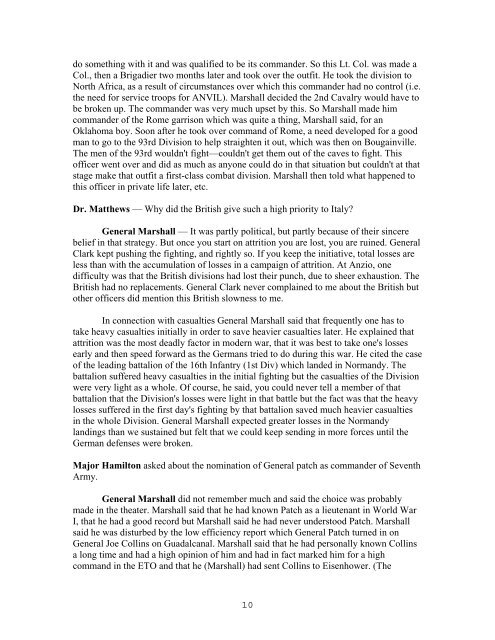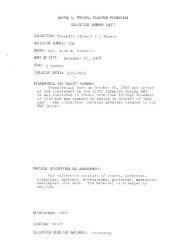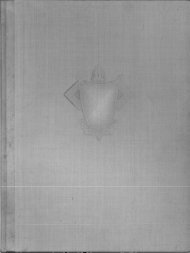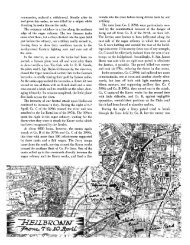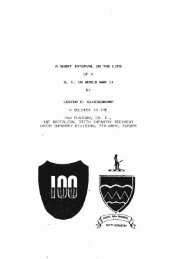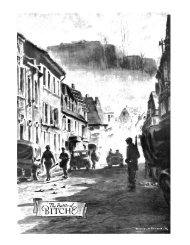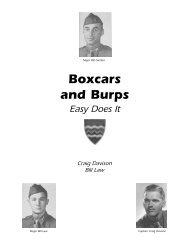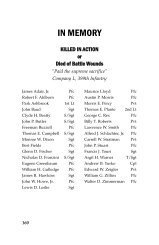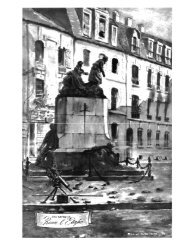July 25, 1949 - The George C. Marshall Foundation
July 25, 1949 - The George C. Marshall Foundation
July 25, 1949 - The George C. Marshall Foundation
Create successful ePaper yourself
Turn your PDF publications into a flip-book with our unique Google optimized e-Paper software.
do something with it and was qualified to be its commander. So this Lt. Col. was made a<br />
Col., then a Brigadier two months later and took over the outfit. He took the division to<br />
North Africa, as a result of circumstances over which this commander had no control (i.e.<br />
the need for service troops for ANVIL). <strong>Marshall</strong> decided the 2nd Cavalry would have to<br />
be broken up. <strong>The</strong> commander was very much upset by this. So <strong>Marshall</strong> made him<br />
commander of the Rome garrison which was quite a thing, <strong>Marshall</strong> said, for an<br />
Oklahoma boy. Soon after he took over command of Rome, a need developed for a good<br />
man to go to the 93rd Division to help straighten it out, which was then on Bougainville.<br />
<strong>The</strong> men of the 93rd wouldn't fight—couldn't get them out of the caves to fight. This<br />
officer went over and did as much as anyone could do in that situation but couldn't at that<br />
stage make that outfit a first-class combat division. <strong>Marshall</strong> then told what happened to<br />
this officer in private life later, etc.<br />
Dr. Matthews — Why did the British give such a high priority to Italy?<br />
General <strong>Marshall</strong> — It was partly political, but partly because of their sincere<br />
belief in that strategy. But once you start on attrition you are lost, you are ruined. General<br />
Clark kept pushing the fighting, and rightly so. If you keep the initiative, total losses are<br />
less than with the accumulation of losses in a campaign of attrition. At Anzio, one<br />
difficulty was that the British divisions had lost their punch, due to sheer exhaustion. <strong>The</strong><br />
British had no replacements. General Clark never complained to me about the British but<br />
other officers did mention this British slowness to me.<br />
In connection with casualties General <strong>Marshall</strong> said that frequently one has to<br />
take heavy casualties initially in order to save heavier casualties later. He explained that<br />
attrition was the most deadly factor in modern war, that it was best to take one's losses<br />
early and then speed forward as the Germans tried to do during this war. He cited the case<br />
of the leading battalion of the 16th Infantry (1st Div) which landed in Normandy. <strong>The</strong><br />
battalion suffered heavy casualties in the initial fighting but the casualties of the Division<br />
were very light as a whole. Of course, he said, you could never tell a member of that<br />
battalion that the Division's losses were light in that battle but the fact was that the heavy<br />
losses suffered in the first day's fighting by that battalion saved much heavier casualties<br />
in the whole Division. General <strong>Marshall</strong> expected greater losses in the Normandy<br />
landings than we sustained but felt that we could keep sending in more forces until the<br />
German defenses were broken.<br />
Major Hamilton asked about the nomination of General patch as commander of Seventh<br />
Army.<br />
General <strong>Marshall</strong> did not remember much and said the choice was probably<br />
made in the theater. <strong>Marshall</strong> said that he had known Patch as a lieutenant in World War<br />
I, that he had a good record but <strong>Marshall</strong> said he had never understood Patch. <strong>Marshall</strong><br />
said he was disturbed by the low efficiency report which General Patch turned in on<br />
General Joe Collins on Guadalcanal. <strong>Marshall</strong> said that he had personally known Collins<br />
a long time and had a high opinion of him and had in fact marked him for a high<br />
command in the ETO and that he (<strong>Marshall</strong>) had sent Collins to Eisenhower. (<strong>The</strong><br />
10


